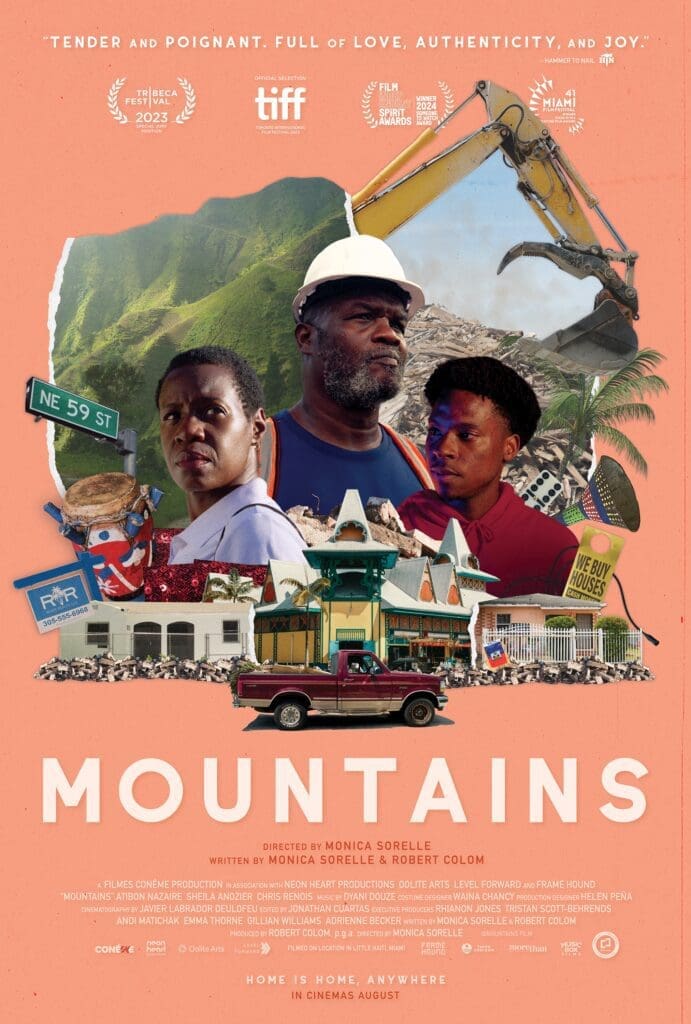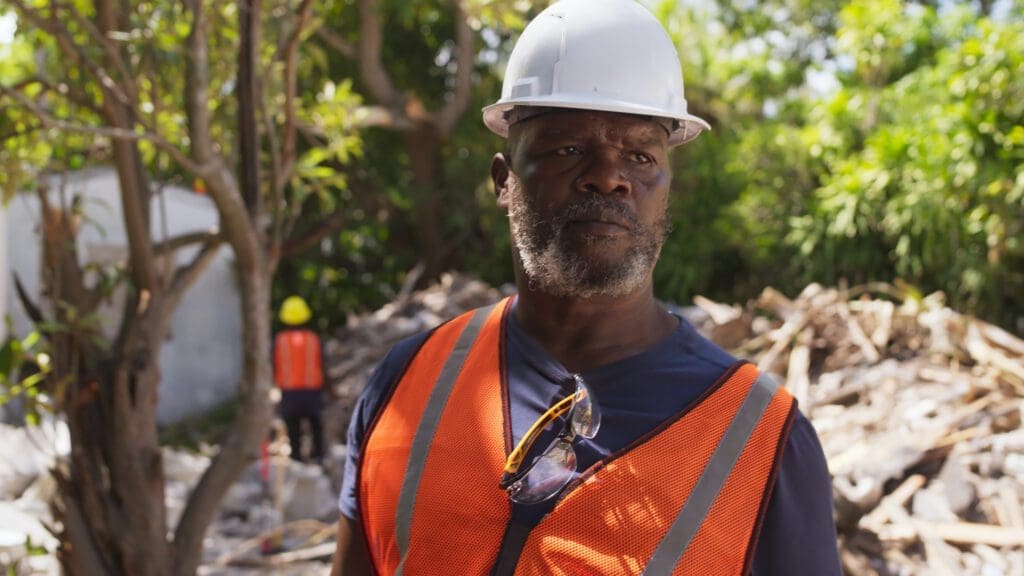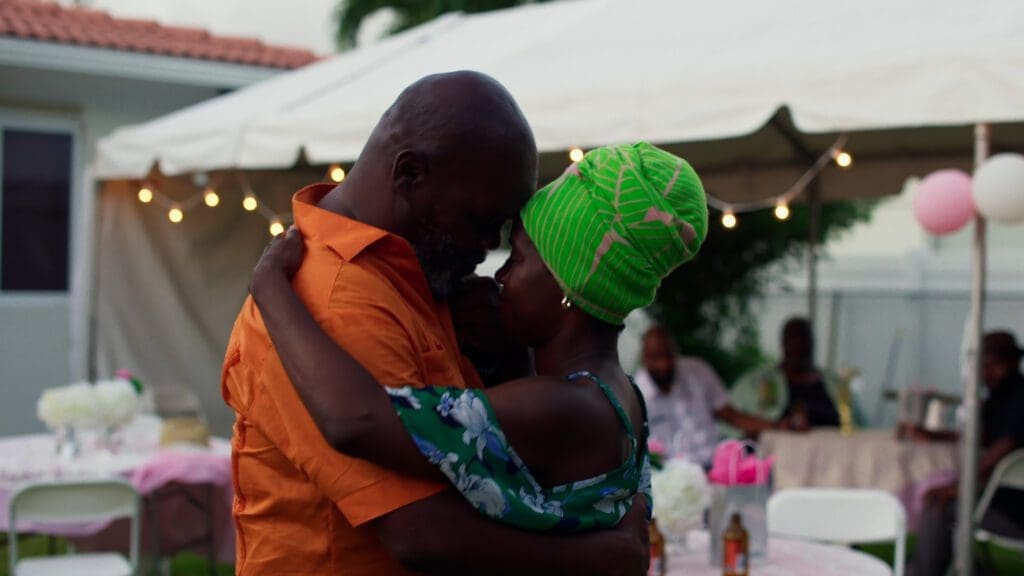Mountains: A Heartfelt Tribute to Little Haiti Amid Miami’s Gentrification
Filmmaker Monica Sorelle’s debut feature, "Mountains," delves into the complexities of gentrification in Miami’s Little Haiti, offering a poignant snapshot of a community on the brink of change.

Filmmaker Monica Sorelle was walking through Wynwood in 2018, looking at the gentrification in the Miami district, when she came up with the idea for “Mountains.”
“It was this Puerto Rican enclave, full of working class warehouses. But over the course of 10 years it turned into an arts district. I’d see houses get demolished every day,” Sorelle says over Zoom.
She and her friend Robert Colom watched a demolition worker end his day, wave goodbye to his co-workers, then cross the street to the “still Puerto Rican suburban side of the neighborhood.” In this moment, Sorelle turned to Colom and remarked, “Imagine he lives over there. He walks to work, and he’s part of the redevelopment of his own neighborhood. What are the implications of that?” Colom immediately turned to Sorelle and told her that they were going to turn her brief imagination into a script.
The result is “Mountains,” which was released in Miami on August 16. Written by Colom and Sorelle, who also directs, “Mountains” tells the story of Xavier, a Haitian demolition worker in the Miami area of Little Haiti, who has to contend with the rapid gentrification of his neighborhood. He has dreams of buying a bigger house just down the street, which he wants to snap up before someone else moves in.
Xavier lives with his wife Esperance (Sheila Anozier), who works as both a seamstress and crossing guard, while maintaining their small but charming home. Their son Junior (Chris Renois) still lives there, too. A college dropout, he works as a parking valet by day, but is an aspiring stand-up comedian at night. There is a growing rift between him and Xavier, who is increasingly disappointed by his Americanized son.

Born and raised in north Miami, Sorelle, 35, spent a lot of her childhood in Little Haiti, where her mother worked. As the only child to her Haitian parents, she would regularly have to keep herself occupied, which she credits for igniting her interest in storytelling. “I was a very voracious movie watcher and reader,” Sorelle says.
At first, Sorelle wanted to become an actress. “That was something I dreamed of my entire childhood.” So much so that she started to look up screenplays to read, which she would then practice in her bedroom. But the more she read these screenplays, the more fascinated she became by the writing. “That inadvertently started my interest in screenwriting. I started learning how to write a screenplay and the rules of storytelling.”
Sorelle remembers being particularly impressed by Kevin Williamson’s screenplay for “Scream,” Charlie Kaufman’s for “Eternal Sunshine Of The Spotless Mind,” and a number of scripts for R-rated movies that she wasn’t allowed to watch at home. Reading these scripts increased her love of cinema, and she soon reached a point in her adolescence where she was “more interested in telling the story rather than acting in it.”
While writing, we switched gears to honoring this community and neighborhood that is disappearing. We look at the film as an archive of this space. It’s a celebration of Little Haiti’s language. Of its architecture. Of its culture.
—Monica Sorelle
When Sorelle was 16 years-old, she joined a weekend class for middle and high school filmmakers that really helped to set her off on her journey toward directing. At the same time, she started to expand her knowledge of different movies and found that she felt a deeper kinship with smaller, more character driven films from across the world.
Watching these she “saw the lane for the kinds of stories” that she wanted to tell. “I was really into independent film, even as an adolescent. I’d be watching the IFC channel and the Independent Spirit Awards. I’d be constantly watching new voices.”
But it took Sorelle a while to accept that filmmaking could be a viable career. “My family were really working class. It wasn’t super accessible to me. I was actually a bit embarrassed at the audacity to even want to be a filmmaker. I didn’t have any doubt I could do it, though.”
After earning her Associate of Arts degree from Miami Dade College and a Bachelor of Fine Arts in Film from the University of Central Florida in Orlando, she produced a number of short films, helping students and alumni with their projects. Having seen a number of people go to Los Angeles and New York with aspirations of making movies, only to end up working in post production houses or no longer in the industry at all, Sorelle knew she didn’t want to move to either of those cities. “I didn’t mind being a big fish in a small pond.”
When she returned to Miami from Orlando in 2014, she initially planned to stay in Florida just until the end of the year. Instead, Sorelle had her eye on moving to New Orleans.
“But there was something bubbling up at the time in Miami artistically and creatively,” she says.
After working on the 2014 documentary short “Papa Machete,” which told the story of the world’s only known master of Haitian machete fencing, Sorelle became inspired.
“I met so many of my future collaborators. I told them I would do anything. I was really eager. This was around 2014, and my new adult life in film, making it my career, started then.”

Sorelle also saw how Little Haiti was being aggressively gentrified in the same way as Wynwood. She even recognized the same construction crews. Eventually, these frustrations at the changing landscape in Miami boiled over and Little Haiti became the muse for “Mountains.”
A week after coming up with the idea, Colom and Sorelle submitted a treatment for the film as part of an application for the Oolite Arts’ Cinematic Arts Residency. In 2019 they were selected as recipients of its $50,000 grant and they spent the next year developing the story and writing the script.
As they wrote, both Colom and Sorelle explored their experiences as the children of immigrants. Sorelle drew upon her own relationship with her father for the dynamic between Xavier and Junior. Most importantly, though, they wanted to give an accurate representation of the Miami that they grew up in.
“We wanted to authentically portray Miami. There are a million stories in the city. But there are also a lot of adults living with their families,” says Sorelle, who at the time was still living with her parents. “That’s because the cost of living is so high. It’s a miracle every month that people can pay their rent. It’s hard.”
Their hope was to go into production on “Mountains” in 2020. Then COVID-19 struck. Filming finally took place in 2022. Since its world premiere at the 2023 Tribeca Film Festival, where it received a Special Jury Mention for US Narrative Feature, it has also screened at the BlackStar, Toronto, and AFI Film Festivals, all while picking up rave reviews. In April 2024, the 34-year-old Sorelle even won the Someone To Watch Award at the Film Independent Spirit Awards, another ceremony that she used to watch religiously as a teenager.
But while “Mountains” will hopefully be the first of many more movies from both Sorelle and Colom, she doesn’t hold any hope for it halting the reconstruction of Miami neighborhoods.

“We wanted to sound the alarms of gentrification,” she says. “But we stopped believing we could stop the machine.”
Instead they now see it as a tribute. “While writing, we switched gears to honoring this community and neighborhood that is disappearing. We look at the film as an archive of this space. It’s a celebration of Little Haiti’s language. Of its architecture. Of its culture.”





